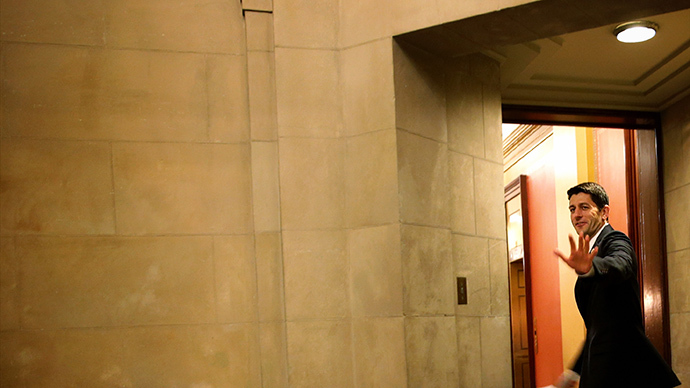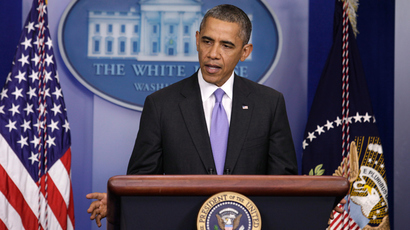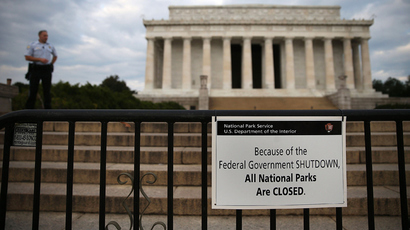Some optimism in Washington amidst shutdown and looming debt default

Optimism is growing in Washington that the White House and House Republicans will reach a deal to avoid defaulting on US debts, a result of negotiations that have taken place over the past day and a development that could hasten the end of the shutdown.
House Republicans met with President Obama Friday morning, submitting a short term proposal that would raise the debt ceiling and reopen the government, and send hundreds of thousands of furloughed employees back to work. Speaking with the press after the session, Republican lawmakers said the meeting was constructive, with Obama focused on major fiscal dilemmas the US is up against as well as the current ongoing crisis.
“It wasn’t a tit-for-tat or this-for-that kind of conversation. It was a more serious policy content conversation,” Senator Bob Corker (R-Tenn.) told The Washington Post.
“I was pleasantly surprised. I think there’s a jelling that’s beginning to take place. I think it’s very possible that over the next short amount of time a constructive agreement may occur.”
The partial government shutdown began on October 1 when the Republican-controlled House of Representatives refused to authorize a national spending plan, first demanding that Obama’s healthcare plan (known as Obamacare) be defunded or delayed, despite already being a law.
The issue is complicated further by the upcoming October 17 date, when the Treasury Department has warned that if the debt ceiling is not raised the US will default on its loans. Forecasters have said that such an action would send the global economy into a tailspin.
Friday’s proposal was a response to the 90-minute meeting at the White House Thursday night. In that session, the first indication that lawmakers might be able to avoid a default, Republicans said they would allow the US to keep borrowing money for another six weeks in exchange for a promise from Obama that he would work with Republicans to find a way to lower the deficit (i.e. make cuts to Obamacare).
The White House cautioned that it would not accept any proposal that would raise the debt limit as a stipulation to the ongoing budget negotiations. That prospect, spokesman Jay Carney said Friday, would force the nation to consider default again when the economy cannot afford to be hindered.
“A debt ceiling increase at only six weeks tied to budget negotiations would put us right back where we are today in just six weeks, on the verge of Thanksgiving and the obviously important shopping season leading up to the holidays,” Carney said. “We should not link the threat of default to budget negotiations.”
The pressure in Washington is growing not only because of the high stakes the shutdown is creating, but also because of the intense hostility to politicians growing throughout the US.
An NBC/Wall Street Journal poll released Thursday showed 60 percent of Americans would be in favor of removing every member of Congress from office, with only 35 percent saying they would keep some current legislators. The 60 percent figure is the highest tally ever recorded in response to that question.
“This isn’t the calm before the storm,” said Fred Yang, a Democrat who helped conduct the bipartisan poll. “This is the storm before the storm.”
Meanwhile, President Obama spoke with groups of about 150
business leaders and 25 state governors on separate phone calls
Friday, giving both an update on talks with Congress to end the
government shutdown and on negotiations to raise the debt ceiling
by the deadline next week.
"The president reiterated that his first order of business is
to urge Congress to reopen the government and remove the threat
of default, and then he is willing to engage with Congress on a
long-term budget," the White House said of the call with
business leaders.
The governors call addressed the impact the shutdown was having
on state budgets and the overall economy.
"He argued that the prolonged shutdown is having adverse
consequences on consumer confidence and businesses, and is
hurting local economies across the country that rely on tourism
at national parks and monuments," the White House said.














